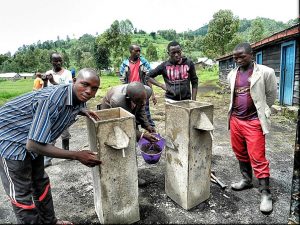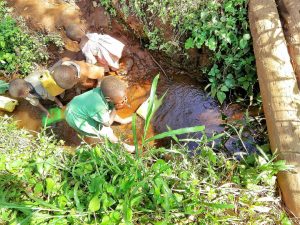Water Charity and the National Peace Corps Association, together with Friendly Water, present YOUTH FOR WATER: Creating a Water Corps
Location:
Mityana, Uganda
Problem Addressed:
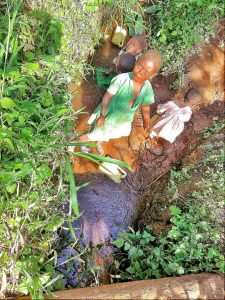 Mityana District in west-central Uganda has some 80,000 households and more than 350,000 people (54% aged between 0-17 years and 21.4% aged between 18-30). Two-thirds of them live in rural areas. Unemployment is the norm, and among youth who are not in school, the unemployed are the clear majority.
Mityana District in west-central Uganda has some 80,000 households and more than 350,000 people (54% aged between 0-17 years and 21.4% aged between 18-30). Two-thirds of them live in rural areas. Unemployment is the norm, and among youth who are not in school, the unemployed are the clear majority.
Nearly 70% of these people, and far higher for rural residents, lack access to even ostensibly clean water. Three-quarters of the population live more than five kilometers from any public health facility.
Waterborne illnesses are the norm. More than 8,300 people are receiving HIV-related services; likely more than double that are affected. Deaths from opportunistic infections related to contaminated water are common, even among those receiving anti-retroviral drugs. Health systems are entirely overwhelmed.
Project Description:
Mityana Rotary President Richard Kyambadde is building a Center for Clean Water, Sanitation, and Hygiene in western Uganda. While the center isn’t finished yet, the people of Mityana District can’t wait for clean water! To this end, this project will train 150 youths to make and distribute BioSand Water Filters.
With the assistance of the district water committee on which he serves and his Rotary, Richard plans to train 10 groups (15 per group) of unemployed youth in fabrication, distribution, installation, and maintenance of BioSand Water Filters, as well as in teaching community sanitation and hygiene. There will be one group for each of the subdistricts in the region, with workshop space provided by local authorities.
Subdistricts of Mityana, Uganda:
Busimbi, Butayunja, Ssekanyonyi, Bulera, Kikandwa, Malangala, Manyi, Kalangalo, Namungo, Manyi and Mityana TC
Each group will be equipped with a pair of Molds, tool kits and all the necessary start-up material in kind and delivered to the construction site. Each group is expected to be self-sufficient in the first three months, as demand for clean water is very high in an area where it is simply otherwise unavailable. The training will take place over a seven-month period.
Once this new “water cadre” is created, there will be additional training in the fabrication of rainwater catchment/Ferro-cement tank systems, MicroFlush toilets, spring- and well-head protection, interlocking bricks, and soapmaking. All of these activities will take place at the new Friendly Water Center. The idea is to create an ongoing “Water Corps,” with youth at least partially employed in ensuring clean water, community sanitation, and hygiene-related services to the entire District.
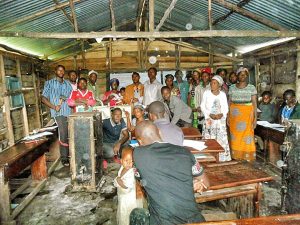
Project Impact:
The project aims at tackling the twin problems of lack of clean water and mass unemployment. A business plan for selling BioSand Filters has already been developed, and each of the ten subdistricts is providing workshop space for the project.
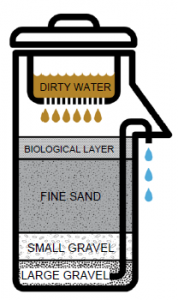 The objective is not only to ensure clean water and employment for some, but by working so intensively with youth, to change consciousness around water-related issues in the entire District.
The objective is not only to ensure clean water and employment for some, but by working so intensively with youth, to change consciousness around water-related issues in the entire District.Person Directing:
A young man of 27, Richard Kyambadde has been Friendly Water for the World’s Uganda Country Representative since he was 20. He is President of his local Rotary Club, member of his District’s water committee, and is completing a degree in environmental management, all while working on the Friendly Water Center in Mityana. He has trained groups in India, Rwanda, and the Congo-DRC, and has traveled as far as South Korea while doing this work. He wants it to be known he is HIV-positive, and is international chair of Friendly Water’s Building New Lives Campaign, which works to transform people with HIV into the water protectors of their communities, with projects currently in five countries.
Monitoring:
Each group will have a trained monitor, who will go into homes to ensure BioSand Filters are installed properly and are being used correctly. Reports from each group will be done in 90 days, at which time business plans will be adjusted as necessary. There will be “before” and “after” health surveys.
BUDGET for Youth “Water Cadre” Training Program – Uganda
| Item Definition | Qty | Price/Unit (USD) | AMOUNT (USD) | Provided by Rotary Mityana | Provided by the trainees | Provided by Water Charity | ||
| BSF construction | ||||||||
| Steel Molds | 20 | 500 | 10,000 | 0 |
10,000 |
|||
| Tool kits | 10 | 470 | 4700 | 0 |
4700 |
|||
| Startup material (send, cement, gravel, tubing, Crisco, metal sheet, sieves) | 10 | 250 | 2500 | 2500 | 0 |
0 |
||
| Transportation of materials to the training site if applicable |
|
|
50 |
|
0 |
50 |
|
|
| Educational Costs | ||||||||
| BSF training Manual | 150 | 10 | 1500 | 0 |
1500 |
|||
| Training materials (sand, cement and gravels) | 02 | 500 | 500 |
500 |
||||
| Certificates | 150 | 2 | 300 | 0 |
300 |
|||
| Note books and pens | 150 | 0.5 | 75 | 75 |
0 |
|||
| Trainers costs | ||||||||
| Trainers honorarium | 2 | 200 | 2000 | 0 |
2000 |
|||
| Trainees costs | ||||||||
| Meals for Trainees | 5x150x3
44 |
3 | 2250 | 2250 |
0 |
|||
| Transport of trainees | 150
44 |
10 | 1500 | 1500 |
0 |
|||
| Evaluation and follow up | ||||||||
| Follow up visit | 6 Months | 200 | 1200 |
1200 |
||||
| Transport | 250 | |||||||
This project has been implemented through the generosity of an anonymous Water Charity donor. Your contribution using the Donate button below will allow us to continue to expand this amazing project.
![]()
